I created a Log File class that uses NLog with the hopes of writing to multiple log files at the same time. This seems to work fine until I add variables to the mix.
Problem
Changing the variable seems to change that variable setting for all instances of the log file instead of the particular instance I am working with.
My Code
Here is how I have the programming structured:
LogClass - Basically a wrapper to give me some additional functionality. The 'SetVariable' is what I am using to set the particular variable (called dqwAlertName)
With this log class, I am passing in the specific logger that I want to use like this:
Public iLogger as new Logger(NLog.LogManager.GetLogger("dataQualityWatcher"),True)
That statement instantiates the logging class with the "dataQualityWatcher" logger and sets Debug=True (which I simply use to allow a more verbose logging that can be turned on and off).
With that said... The statement above is ALSO within another class object:
dataQualityWatcher Class - This is a 'watcher' that is called many times over and runs continuously. If you familiar with FileSystemWatcher, it works similarly to that. It basically watches data for a specific value and raises an event.
Inside THIS class is where I instantiate the logger as mentioned above with the following code:
Public iLogger as new Logger(NLog.LogManager.GetLogger("dataQualityWatcher"), True)
iLogger.SetVariable("dqwAlertName", _AlertName)
The first line instantiates, the second line will set the variable. The Logging Class SetVariable method is pretty basic:
Public Sub SetVariable(variableName as string, value as String)
'Set variable context for the logger
NLog.LogManager.Configuration.Variables(variableName) = value
End Sub
I am using that variable within the NLog.config file in the following manner:
<variable name="LogLayout" value="[${date:format=MM/dd/yyyy h\:mm\:ss.fff tt}] [${gdc:item=location}] | ${level} | ${message}" />
<variable name="InfoLayout" value="[${date:format=MM/dd/yyyy h\:mm\:ss.fff tt}] ${gdc:item=SoftwareName} Version ${gdc:item=SoftwareVersion} - ${message}" />
<variable name="DebugInfoLayout" value="[${date:format=MM/dd/yyyy h\:mm\:ss.fff tt}] ${message}" />
<variable name="logDir" value="C:/Log/PWTester/" />
<variable name="dqwAlertName" value="" />
<targets>
<target name="dataQualityWatcher" xsi:type="File" fileName="${logDir}/LogFiles/${var:dqwAlertName}-DataQualityWatcher.log" layout="${LogLayout}" />
</targets>
<rules>
<logger name="dataQualityWatcher" minlevel="Trace" writeTo="dataQualityWatcher" />
</rules>
THE PROBLEM:
I run multiple 'watchers' (as I call them) with the following code to create that object and assign properties:
dataWatch.Add(New dataQualityWatcher(True) With {.Tags = lstTags, .AlertTimerInterval = Convert.ToInt64(intTimerMilliseconds), .AlertGroupID = Convert.ToInt64(CARow(0)), .EmailGroupID = Convert.ToInt64(CARow(1)), .CustomSubject = CARow(3), .CustomMessage = CARow(4), .AlertName = DataAlertGroupName, .Debug = blnVerboseLogging, .HistorianServer = SH})
Multiple Version Example
I run the code above where: .AlertName = {"Test1", "Test2", "Test3"}. Other parameters would also change and a new object is instantiated each time. In this example there are 3 dataQualityWatcher objects instantiated, which also instantiates 3 Logger objects.
Each time a new dataQualityWatcher object is instanciated, it instanciates a Logger, which would then write to the file. The AlertName variable is passed on through the SetVariable method above.
I would expect 3 log files to be written:
- Test1-DataQualityWatcher.log
- Test2-DataQualityWatcher.log
- Test3-DataQualityWatcher.log
This DOES happen. However, the last dataQualityWatch object that is created will run the SetVariable method = "Test3" (in this example). Now that variable is set and all 3 Loggers will begin logging to that file (i.e., Test3-DataQualityWatcher.log).
I can only assume that there is a better way to do this with variables such that they are for the life of that particular log instance, but I can't seem to figure it out!
Thanks in advance and sorry for the VERY, VERY long post.

